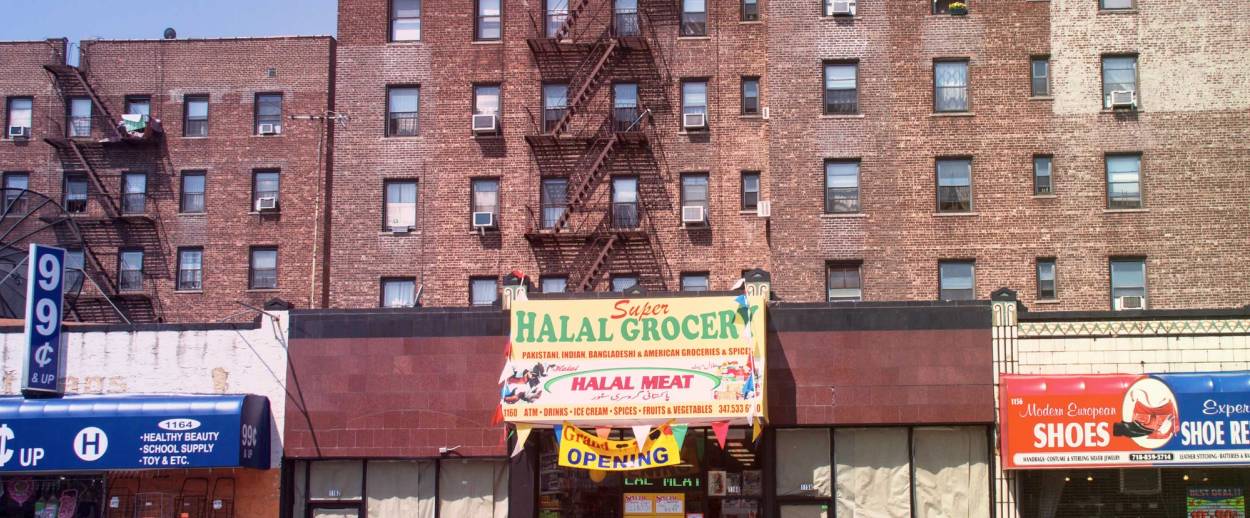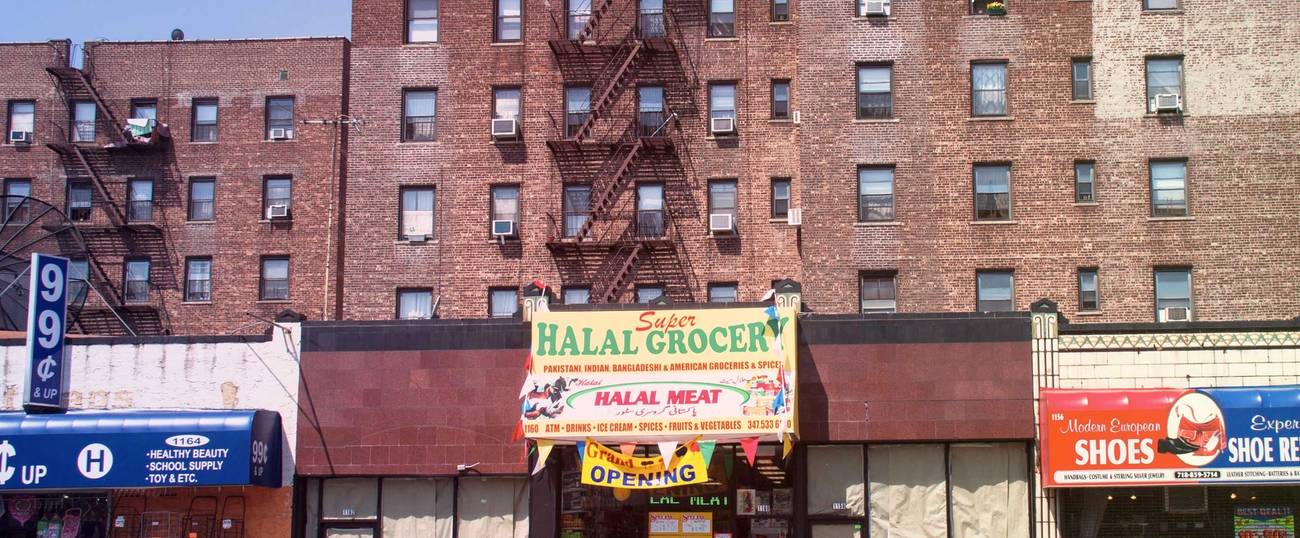The Rise of Halal-Certified Food
Mirroring a model set decades ago to certify kosher products, American Muslims witness the growth of the ‘Muslim hekhsher’




As someone who keeps a kosher kitchen, I pay close attention to the foods that come into my home. Before tossing a bottle of vinegar, a box of cereal, or a loaf of bread into my grocery cart, I give the package a once-over, scanning for a stamp of approval from a kosher-certifying agency. Any product that does not bear the kosher mark goes back (sometimes with great reluctance) on the shelf.
Over the past several years, while looking for one of the dozens of insignias from third-party kosher certifiers, I began to notice another seal showing up with increasing frequency: a crescent moon surrounding the letter “M.” A quick search revealed that it belonged to the Islamic Food and Nutrition Council of America, or IFANCA. “Cool,” I remember thinking. “A Muslim hekhsher.”
I’m hardly the only person to notice the change. “We are absolutely seeing it more and more now,” said Zaid Kurdieh, an observant Muslim who runs the organic Norwich Meadows Farm in upstate New York. “Cheese is most noticeable, but it is on other products, too.” The numbers back up this anecdotal evidence: IFANCA, which certifies thousands of food companies as well as health and beauty products, has a robust annual growth rate of around 15 percent. And according to a recent Bloomberg article, Whole Foods “ranks halal among its fastest-growing categories, with double-digit sales growth in each of the last five years.”
Some companies, like Saffron Road, which makes gourmet frozen meals and a variety of snack and convenience foods, were launched with the halal consumer specifically in mind. Meanwhile, a handful of big-name national food companies from Organic Valley and Cabot to Pom Wonderful and Godiva have jumped on the halal-certification bandwagon.
IFANCA was founded in 1982 to help educate consumers about which products met—or didn’t meet—halal requirements. From there, said Roger Othman, IFANCA’s director of consumer relations, “we quickly evolved to help the industry produce products acceptable to halal consumers.” Other certifying agencies have emerged in America over the last three decades, including the American Halal Foundation and ISWA Halal. And there are certifiers from other countries with significant Muslim populations like Malaysia and India, whose products occasionally make it onto shelves in the United States. But IFANCA’s seal remains the most widely recognized. “They have a longstanding reputation at this point,” said Yvonne Maffei, an influential halal food blogger and author of My Halal Kitchen. “When people see their certification on a product, they say, ‘Oh it’s IFANCA, so it must be OK.’”
***
Replace IFANCA’s Crescent M with an O.U., Star K, or CRC, and kosher consumers can certainly relate to the sentiment. After all, kosher certification emerged in America a century ago (in 1923, Heinz’s vegetarian beans became the first product to bear a national hekhsher—a kosher seal) for precisely the same reason. “Kosher certification is a 20th-century invention, driven by technology,” writes Sue Fishkoff in her definitive book on the subject, Kosher Nation. “People don’t need a rabbi to tell them a raw apple is kosher. But as soon as that apple is cooked, canned, frozen, freeze-dried, or packaged … it becomes subject to rabbinic oversight to ensure that the laws of kashrut are not being violated in the process.”
The same logic holds true for halal. The American food system is complicated and often frustratingly opaque. Third-party certification helps takes the guesswork out of food shopping, particularly for products with long and complex ingredient lists that make it difficult to know exactly what is inside the wrapper. Halal-minded shoppers, Maffei told me, have had to become expert ingredient sleuths. “Muslims are constantly calling food companies to find out what is in the cheese or what’s in the bread,” she said. “You will even see kids and teenagers calling snack-food companies to find out if they can eat a bag of Doritos.”
Some consumers also turn to kosher-certified products when they cannot find halal equivalents at the supermarket. The requirements for observing kosher and halal dietary rules overlap, though with notable differences: Both systems forbid the consumption of pork (including its byproducts, like gelatin) and animal blood. And both have specific, though distinct, requirements for how an animal should be slaughtered. There are key differences between the two systems: Kashrut allows wine and other alcoholic spirits, where halal does not. And unlike kashrut, halal does not prohibit shellfish or mixing milk and meat.
While it is not regarded as ideal, Muslims are permitted to eat meat slaughtered by people of other Abrahamic faiths, meaning religious Jews and Christians. “I used to always buy kosher chicken before there was a halal alternative,” said Maffei. “And I still buy kosher salami because we don’t have that as a halal product,” she said. Similarly, Kurdieh’s wife, Haifa, told me that she looked for a hekhsher on cheese as a way of ensuring it was not made with animal rennet.
The rise of halal-certified products is certainly a convenience for Muslims who wish to observe their faith’s dietary laws. But more than that, these products offer a powerful—and highly visible—symbol that Muslim communities are an important part of American society, even as Muslims find themselves increasingly under attack, politically and physically. “Seeing beautifully packaged halal chicken in the supermarket makes me feel so normal,” Maffei said. “I can go to the store and put a chicken in my cart instead of having to walk by and say, ‘There’s nothing here for me.’” Any kosher-keeping Jew who remembers the moment—not so long ago—when Oreo cookies got a hekhsher can relate.
So how fast can the market grow? There are about 3.3 million Muslims living in America today, representing about 1 percent of the total population. According to IFANCA’s estimates, a significant majority of American Muslims follow the foundational halal requirements of avoiding pork and alcohol. “There are likely different levels of ‘strictness’ when you go beyond that,” Othman said.
From a food manufacturer’s perspective, that is not a huge potential customer base. But the Muslim population in America is quickly expanding (numbers are up from 2.35 million just a decade ago). Meanwhile, the country’s Jewish population is not much bigger, estimated to be somewhere around 5.7 million, or around 2 percent of the population. And yet, according to a recent survey, a disproportionately high 41 percent of new products produced in 2014 were certified kosher. As Fishkoff writes in Kosher Nation, the kosher industry has done a remarkable job of tapping into other niche markets while gaining a (not necessarily deserved) reputation for being cleaner and safer than nonkosher equivalents. “At least 86 percent of the nation’s 11.2 million kosher consumers are not religious Jews,” Fishkoff writes. Indeed, many are not Jewish at all.
In order for the halal market to similarly punch above its weight, American food companies will have to be convinced that they can get a worthwhile return on their investment. That includes marketing certified products to the country’s growing Muslim community while maintaining customers’ trust. To that end, websites like Maffei’s My Halal Kitchen and Zabihah, an online halal restaurant guide, serve as a vital link between companies and consumers. It also includes exporting halal-certified products to Muslim communities abroad, broadening focus to new sectors (like hospitality and food service) that are good candidates for certification, and appealing to non-Muslim customers who appreciate the benefits that come from having another set of eyes on their food.
Fishkoff pinpoints the 1980s as the moment when the kosher-certification industry reached its tipping point and began its “meteoric rise.” By comparison, that is the same decade that IFANCA started certifying halal products. “We are in a transition stage right now,” Maffei said of the American halal market. With any luck, it might just be transformational.
***
Like this article? Sign up for our Daily Digest to get Tablet Magazine’s new content in your inbox each morning.